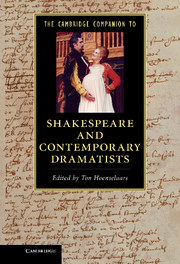Book contents
- Frontmatter
- Contents
- Illustrations
- Contributors
- Preface
- Chronology of the life and work of Shakespeare and contemporary dramatists
- 1 John Lyly and the University Wits
- 2 Thomas Kyd and the Elizabethan blockbuster
- 3 ‘The words of Mercury’
- 4 The dyer’s hand
- 5 Urbane John Marston
- 6 Thomas Dekker and the emergence of city comedy
- 7 Shakespeare
- 8 Thomas Heywood
- 9 George Chapman’s learned drama
- 10 Francis Beaumont and John Fletcher’s tragicomedy as musical melodrama
- 11 Thomas Middleton and the early modern theatre
- 12 John Webster
- 13 John Ford
- 14 Philip Massinger
- 15 Richard Brome and the idea of a Caroline theatre
- 16 Troublesome histories
- Select bibliography
- Index
Preface
Published online by Cambridge University Press: 05 December 2012
- Frontmatter
- Contents
- Illustrations
- Contributors
- Preface
- Chronology of the life and work of Shakespeare and contemporary dramatists
- 1 John Lyly and the University Wits
- 2 Thomas Kyd and the Elizabethan blockbuster
- 3 ‘The words of Mercury’
- 4 The dyer’s hand
- 5 Urbane John Marston
- 6 Thomas Dekker and the emergence of city comedy
- 7 Shakespeare
- 8 Thomas Heywood
- 9 George Chapman’s learned drama
- 10 Francis Beaumont and John Fletcher’s tragicomedy as musical melodrama
- 11 Thomas Middleton and the early modern theatre
- 12 John Webster
- 13 John Ford
- 14 Philip Massinger
- 15 Richard Brome and the idea of a Caroline theatre
- 16 Troublesome histories
- Select bibliography
- Index
Summary
Preface
The contributors to this volume of newly commissioned essays introduce Shakespeare and a vast range of fellow dramatists in the early modern theatre, including John Lyly, Christopher Marlowe, Thomas Kyd, John Marston, Thomas Heywood, Thomas Dekker, George Chapman, Ben Jonson, Thomas Middleton, Francis Beaumont, John Fletcher, Philip Massinger, John Webster, John Ford and Richard Brome. The essays examine the lives of these dramatists and discuss their individual achievements in detail. The essays are, however, also mindful of the fact that close personal and professional relations existed between Shakespeare and the other dramatists in the early modern theatre. Attention, therefore, is also devoted to the multiple forms of interaction between them – involving tutelage and encouragement as well as occupational rivalry and collaborative authorship. This approach to Shakespeare and his fellow dramatists enhances our appreciation of the single-authored as well as the collaborative plays that together represent the most impressive body of drama in English stage history.
The essays in this collection introduce the playwrights and a number of their works in chronological order. They range from Arthur Kinney’s full account of John Lyly and the University Wits in the 1580s and 1590s – whose hyper-inventive use of the English language and experiments with dramatic representation left an indelible stamp on Shakespeare’s work – to Lisa Hopkins’s discussion of John Ford, whose ’Tis Pity She’s a Whore (1632) and Perkin Warbeck (1633) may be read as Caroline appropriations of Shakespearean models for tragedy and history. Kyd’s charismatic Spanish Tragedy, as Clara Calvo demonstrates, was an inevitable presence, a familiar text for nearly every dramatist of the period to quote, to revise, to imitate, to emulate, to parody, but never to ignore.
- Type
- Chapter
- Information
- Publisher: Cambridge University PressPrint publication year: 2012

